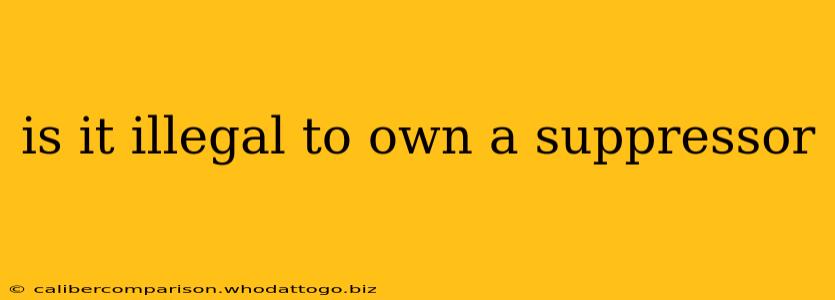The legality of owning a suppressor, also known as a silencer, in the United States is a complex issue governed by federal law and, in some cases, state regulations. Simply put, owning a suppressor is not illegal, but it's heavily regulated. This means it's not something you can simply walk into a store and buy. There's a specific process you must follow, and failure to do so can result in serious legal consequences.
Understanding the National Firearms Act (NFA)
The key to understanding suppressor legality lies in the National Firearms Act (NFA) of 1934. This act classifies suppressors as "firearms" and subjects them to strict regulations. This means they are considered a different category of firearm than pistols, rifles, or shotguns.
Key Aspects of NFA Regulations Regarding Suppressors:
- Registration: Before you can legally own a suppressor, you must register it with the Bureau of Alcohol, Tobacco, Firearms and Explosives (ATF). This involves completing ATF Form 4, undergoing a thorough background check, and paying a significant tax.
- Background Check: The background check is extensive and includes fingerprinting. Individuals with a history of felony convictions, certain misdemeanor convictions, or domestic violence restraining orders are typically ineligible.
- Tax Stamp: A $200 tax stamp is required for each suppressor registered. This tax is part of the NFA's regulatory framework.
- Waiting Period: There is a significant waiting period (often several months) between submitting your application and receiving approval from the ATF.
State Laws and Suppressor Ownership
While federal law dictates the basic requirements, some states have additional regulations or even outright bans on suppressor ownership. It's crucial to research your state's specific laws before considering purchasing a suppressor. Failing to comply with both federal and state regulations can lead to severe penalties, including hefty fines and imprisonment.
The Process of Legally Obtaining a Suppressor
The process can seem daunting, but if you follow the steps meticulously, it’s manageable. Here's a general overview:
- Research: Understand both federal and state laws regarding suppressor ownership in your jurisdiction.
- Find a Licensed Dealer: You must purchase a suppressor from a licensed dealer who is registered with the ATF to handle NFA items.
- Complete ATF Form 4: Accurately fill out all required information on the ATF Form 4.
- Fingerprinting and Background Check: Undergo the required fingerprinting and background check.
- Pay the Tax Stamp: Submit the $200 tax stamp payment.
- Waiting Period: Be prepared for a significant waiting period (potentially several months).
- Approval and Take Delivery: Once approved, you can take possession of your suppressor.
Potential Misconceptions About Suppressors
- Complete Silence: Suppressors significantly reduce the sound of a firearm, but they do not render it completely silent.
- Ease of Acquisition: The process of obtaining a suppressor is lengthy and complex. It is not a quick or simple process.
- Legal Use: Even with a registered suppressor, its use is still subject to all applicable federal, state, and local laws regarding firearms.
Conclusion
Owning a suppressor in the United States is legal, but only if you strictly adhere to all federal and state regulations under the NFA. The process requires patience, careful attention to detail, and a thorough understanding of the applicable laws. Ignoring these requirements can have severe legal repercussions. Always consult with a legal professional and an ATF-licensed dealer to ensure compliance with all applicable laws before attempting to purchase or possess a suppressor.

